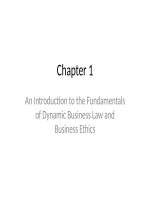An introduction to the fundamentals of dynamic business law and business ethics chap015
Bạn đang xem bản rút gọn của tài liệu. Xem và tải ngay bản đầy đủ của tài liệu tại đây (107.12 KB, 27 trang )
Chapter 15
Sales and Lease Contracts:
Performance, Warranties, and
Remedies
McGraw-Hill/Irwin
Copyright © 2013 by The McGraw-Hill Companies, Inc. All rights reserved.
Chapter 15 Ethical Dilemma
According to the “perfect tender” rule of Uniform Commercial Code (UCC) Section 2-601,
if goods or tender of delivery fail in any respect to conform to the contract, the buyer has
the legal right to accept the goods, reject the entire shipment, or accept part and reject
part. Obviously, this is an extremely “pro-buyer” rule, giving the buyer great flexibility in
terms of how to respond to less-than-perfect goods, or a less-than-perfect delivery. For
example, if the buyer orders ten (10) pink plastic flamingoes to be delivered by the last
day of the calendar year, and the seller delivers five (5) pink plastic flamingoes on
December 31, the buyer has the following options available under the UCC: 1) The
buyer can accept the entire nonconforming shipment; 2) The buyer can reject the entire
shipment; or 3) The buyer can accept part and reject part of the shipment.
From an ethical standpoint, should the buyer accept that portion of the shipment which
conforms to the contract? In the above example (and again, from an ethical perspective),
should the buyer accept the five (5) pink plastic flamingoes delivered on December 31?
In the fast-paced business world, is perfection too exacting of a standard to impose on a
merchant seller?
15-2
Chapter 15 Case Hypothetical
Determined to carry on the hilarious tradition of placing a number of pink plastic
flamingos in another person’s yard as a practical joke, and with several co-workers in
mind, Dorothy Hayes orders 100 pink plastic flamingos (for a total contract price of $500)
from Tropical Novelties of Tampa, Inc. The contract specifies delivery of the flamingos to
Dorothy’s home in Poughkeepsie, New York on or before September 1.
On August 31, Amalgamated Package Service (A. P. S.) delivers five large boxes to
Dorothy’s home. With much anticipation, Dorothy tears open the boxes, only to find 50
pink plastic flamingos, 50 short of the specified contract quantity.
Disappointed that Tropical Novelties did not satisfy its “part of the bargain,” and realizing
that $500 is a large amount to pay for a practical joke, Dorothy decides to terminate the
contract. She calls Tropical Novelties, speaks with a sales representative, notifies the
seller that she is canceling the contract due to its non-performance, and informs the
seller that she will be returning the 50 flamingos by package delivery service the following
day. Tropical Novelties demands that she keep the 50 flamingos, notifies her that they
will ship the remaining 50 the following day, and assures her that she will be held
responsible for paying the $500 contract price.
Who wins?
15-3
Chapter 15 Case Hypothetical
Fred G. Dare Appliances, Inc. sold a $2,000 refrigerator to W.H. Pool. Per the
terms of the agreement, the buyer was to pick up the appliance on July 1, and pay
for it in full before taking possession. July 1 came and went, and the buyer did not
appear. Fred G. Dare, the owner of the store, is certain that W.H. Pool breached
the contract.
Fred has a plan. His best friend, Sam S. Ung, desperately needs a new
refrigerator, but he cannot currently afford one at full retail price. In fact, Sam only
has $200. Fred plans to sell the refrigerator to Sam for $200, and then send a bill
for $1,800 to W.H. Pool. (The $1,800 represents the difference between the price
of the refrigerator in Fred G. Dare Appliances, Inc.’s contract with W.H., and the
“resale” price of $200 to Sam.) Fred’s reasoning is that W.H. breached the contract,
and that he is simply exercising his resale right. Fred’s brother-in-law, an attorney,
once told him that if a customer breaks a purchase contract, the seller has the right
to resell the good to a substitute buyer, and then recover any damages from the
original, breaching buyer.
What is your legal opinion of Fred G. Dare’s plan?
15-4
Chapter 15 Case Hypothetical
Hale “Billy” Hatfield is an avid banjo player and bluegrass aficionado. Billy wants to purchase a new banjo for
his appearance at the local “Bluegrass in the Park” festival scheduled for August 15.
On June 1, Billy orders a “Timber Rattler” brand banjo from Cates Banjo Company of Mountain View, West
Virginia. The “Timber Rattler” is custom-made, and the contract specifies a purchase price of $4,000. The
contract indicates a delivery date of August 10, allowing ample time for production of the banjo, and enough
time for Billy to make his “gig.”
August 10 “comes and goes,” and Cates Banjo fails to deliver the instrument. When Billy contacts the owner
of Cates Banjo, Richmond Cates, he learns that non-delivery was due to a month-long backlog of orders.
Billy knows that he can ill-afford to wait for his “Timber Rattler,” and he cancels his contract, regrettably, with
Cates Banjo.
On August 12, Billy orders a pre-produced banjo from Babson Instruments, Inc., at a contract price of $6,000.
By rush delivery, the Babson banjo arrives at Billy’s home on August 14, and he is able to make the
“Bluegrass in the Park” festival with banjo “in hand.” By Billy’s estimation, the Babson instrument is no true
substitute for the “Timber Rattler,” but he is willing to keep it, and is reasonably satisfied with it.
Billy’s neighbor is an attorney. Billy shares the above facts with his lawyer/neighbor, and asks him if he will
take the case, suing Cates Banjo for $2,000 (the difference between the price of the Cates banjo, and the
price of the Babson banjo,) plus associated expenses of litigation.
Should the attorney take the case? Will Billy win?
15-5
Chapter 15 Case Hypothetical
Recall from the Chapter 10 Case Hypothetical and Ethical Dilemma
that Lily Ledbetter was seriously injured in an automobile accident
when the steering wheel of a new car she had just purchased detached
from the steering column (the steering wheel literally came off in her
hands), causing Lily to crash into a culvert. In terms of drafting the
personal injury complaint against Fjord Motors, Inc. (the manufacturer
of the sedan) and Bjorn Fjord Motors, Inc. (the dealership), what
theories of warranty liability should Lily’s attorney include? Are there
any non-warranty (i.e., non-Uniform Commercial Code) theories of
liability that might be applicable in this case?
15-6
Chapter 15 Case Hypothetical
Aristotle Mythos is having a “mid-life crisis,” in large part because he is 50 years old, and he realizes that most people
do not live to be 100. In an attempt to conquer his depression, and to prove that he is equivalent to a 20-year-old (at
least in spirit,) Mythos plans to climb Mount Zeus, the highest peak in his ancestor’s homeland of Greconia.
In preparation for his climb, Mythos patronizes the local “outdoors” shop, Athena’s Garden, and asks to speak with a
trained sales associate. Mythos specifies that he will be climbing Mount Zeus, and that he will need a tent and
sleeping bag to survive the wind and elements on two nights during his ascent and descent. The associate selects a
tent and sleeping bag from a wide variety of possibilities, and Mythos leaves the store a “happy camper.”
Mythos begins his climb the following day, and successfully reaches his check point, halfway to Zeus’ peak, before
nightfall. He prepares his campsite, and looks forward to some much-needed rest. Unfortunately, he has a fitful night,
shivering in his sleeping bag below a partially-collapsed tent, with the wind and the cold “getting the best of” Mythos
and his camping gear.
In the daylight of the following morning, Mythos fully awakens to realize that the toes on both of his feet have turned a
sickening shade of blue-purple, and he realizes with great disappointment that he will not be able to fulfill his dream of
climbing Mount Zeus. Further, upon closer examination of his tent and sleeping bag, both are trademark-stamped
“The Young Mythologist,” gear intended for backyard camping by children.
As a result of his misfortune, Mythos must have four toes (two toes on each foot) amputated, and he incurs medical
expenses of $58,000 for treatment and rehabilitation. Mythos’ doctor has rated him with 20% permanent partial
disability as a result of his toe amputations.
Is Athena’s Garden legally responsible for Mythos’ medical expenses and partial disability? If so, on what theory?
15-7
The Basic UCC Performance
Obligation
• Sellers and lessors are obligated to transfer
and deliver conforming goods
• Buyers and lessees are obligated to accept
and pay for conforming goods in
accordance with terms of contract
• “Good faith” required in performance and
enforcement of every contract
15-8
“Good Faith”
• Definition: Honesty in fact
• In transaction between merchants, UCC
also imposes obligation of reasonable
commercial standards of fair dealing
(“commercial reasonableness”)
15-9
“Perfect Tender” Rule
States that if goods or tender of delivery
fail in any respect to conform to contract,
buyer/lessee has right to:
1) accept the goods;
2) reject entire shipment; or
3) accept part and reject part
15-10
Exceptions to “Perfect Tender” Rule
• Industry Standards
• Prior Dealings Between Parties
• Exceptions Outlined in Parties’ Agreement
• Seller’s/Lessor’s Right to Cure
• Destroyed Goods
• “Substantial Impairment”
• “Commercial Impracticability”
15-11
“Commercial Impracticability”
Doctrine
Delay in delivery or non-delivery may not, in
court’s discretion, constitute breach if
performance made impracticable because
contingency has occurred that was not
contemplated when parties reached
agreement
15-12
Inspection, Rejection and Revocation of
Acceptance
• Seller/lessor must provide buyer opportunity to
inspect goods
• “Reasonableness” governs inspection process
• Post-inspection, buyer has option to accept, partially
accept, reject, or revoke acceptance
-UCC guidelines govern right to exercise particular
options post-inspection
• Buyers/lessees must give reasonable notice upon
exercising right of rejection/revocation of acceptance
15-13
Warranties
15-14
Warranty
Definition: Seller’s promise(s)
regarding certain characteristics of
good(s) sold
15-15
“Express” Warranty Versus
“Implied” Warranty
• Express Warranty: Explicitly stated
in contract
• Implied Warranty: Automatically (by
operation of law) applied to contract
15-16
Types of Warranties
Warranties of Title
• Passage of good title
• Implied promise of no liens/judgments
against title
• Implied promise that title not subject to
claims of intellectual property (copyright,
patent, or trademark) infringement
15-17
Types of Warranties
Express Warranties
• Description of good’s physical nature or its use
• May be found in advertisements or brochures
• May be material term of contract
• Salesperson’s oral promise concerning good can
give rise to express warranty
• Buyer’s reliance on seller’s representations
generally means those representations become
express warranties, and part of contract
15-18
Types of Warranties: Implied Warranties
• Implied Warranty of Merchantability (Definition): Warranty
based on reasonable expectation of product performance
• Good purchased must:
-Pass without objection in trade/market for similar goods
-Be of fair quality (within the product’s description)
-Be fit for “ordinary use”
-Have “even kind, quality and quantity”
-Be adequately packaged and labeled
-Conform to promises made on package/product label
15-19
Types of Warranties: Implied
Warranties
Implied Warranty of Fitness For Particular
Purpose
(Definition): Warranty that arises when seller
knows purpose for which buyer purchasing
goods, and buyer relies on seller’s judgment to
recommend/select certain product
Seller does not have to be merchant to make
this warranty
15-20
Types of Warranties: Implied
Warranties
Implied Warranty of Trade Usage
(Definition): Warranty that arises as
result of generally-accepted trade
practices
15-21
Warranty Rights of Third Parties:
Third Party Beneficiaries of Warranties
Seller’s warranties may extend to:
• Buyer’s household members and guests
• Any “reasonable and foreseeable” user
• Anyone injured by good
15-22
Warranty Disclaimers and Waivers
Methods of Disclaiming/Waiving Warranties:
• Seller does not make express warranties
• Seller disclaims implied warranties in clear,
unambiguous, conspicuous language
• Buyer fails/refuses to examine goods
• Buyer fails to file suit within applicable
statute of limitations period
15-23
UCC Remedies Available to Seller/Lessor
When Buyer/Lessee In Breach of
Contract
•
•
•
•
•
•
Cancel Contract
Withhold Delivery
Resell/Dispose Of Goods
Sue to Recover “Benefit of Bargain”
Stop Delivery
Reclaim Goods
15-24
UCC Remedies Available to
Buyer/Lessee When Seller/Lessor In
Breach of Contract
•
•
•
•
•
•
•
•
Cancel Contract
Obtain “Cover”
Sue to Recover Damages
Recover Goods
Obtain “Specific Performance”
Reject Non-Conforming Goods
Revoke Acceptance of Non-Conforming Goods
Accept Non-Conforming Goods and Seek
Damages
15-25









